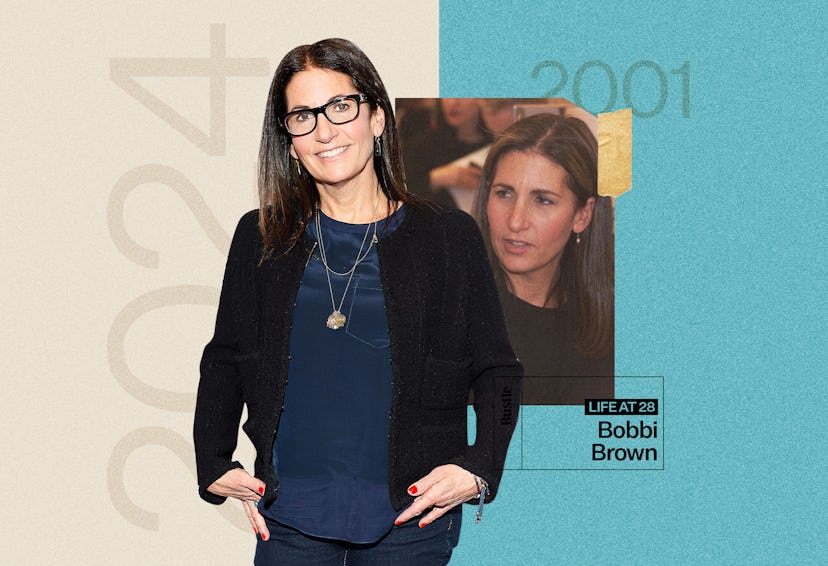28
At 28, Bobbi Brown Was Hustling To Keep Her Makeup Artist Career Alive
She did Naomi Campbell’s first Vogue cover but was worried about paying rent.

It was 1986, and 28-year-old Bobbi Brown was at the height of her career as a professional makeup artist working with celebrities and models for magazines and fashion shows. Back then, as a freelancer, it was “feast or famine,” she says, and her primary goal was to just keep booking jobs. At that time, she never even thought about owning her own company or going corporate.
“I was always worried about how I was going to pay the rent,” Brown recalls. “If I did a job, I wondered if they would hire me again, because everything was about who wanted me around and who didn’t. But I also got to do really great things, including shooting a Vogue cover.”
The cover star in question? Naomi Campbell. “She was then a young model, and it was her first Vogue cover,” she says.
It was a mere nine years later that Brown created — and then sold — her makeup line, Bobbi Brown Cosmetics, to Estee Lauder for a reported $74.5 million, with Brown staying on as chief creative officer. The deal came with a 25-year noncompete that expired in 2020 — after which she immediately began her next venture in the same field.
Most beauty lovers know Brown’s next chapter. Her clean, minimalist makeup line, Jones Road, is an Instagram darling that’s quickly achieved cult status in the industry. Her skin-care-meets-makeup Miracle Balm is a smash hit. In 2025, the company — which she founded with her son, Cody — will celebrate five years, with projected revenues for 2024 topping $150 million.
At a Jones Road event in Chicago in October, Brown discusses how, in the decade of neon leg warmers and bright blue eyeshadow, she took a different approach, launching a natural makeup phenomenon that has lasted for decades and inspired hundreds of brands to follow her lead.
Who were your guiding lights at 28 that you relied on for counsel and inspiration?
I think a lot of it was my mom. I relied on her, my aunt Alice, and my sister Linda. I also leaned on a couple of girlfriends and whatever agent I had at the time. My agents had to take on all my angst — “How come so-and-so’s not calling? What’s happening?” So, thank you to all those agents who supported me when I kind of lost it.
What was the mantra that inspired you at the time?
My favorite line is “You’ve got this.” I don’t always realize that I have it, but if I tell myself I do, I somehow figure it out. The thing is, when I first started as a makeup artist, it was the ’80s, and makeup was so over the top and so artificial, so unnatural. So my ideas were not in vogue at the time.
I think without realizing it, I helped change people’s attitudes about makeup — that you could actually blend the cheeks and they look good, or find a foundation to match the color of your skin. That all kind of led me to realize that there was a hole in the market that I could fill.
You were quoted in a magazine article that at around age 30, you saw actor Debra Winger in a magazine, and she inspired you to be OK with aging, specifically laugh lines.
I will never forget it! She was on the cover of Interview, and it was a black and white picture. She was laughing, her head was back, and she had lines outside of her eyes. And I realized, OK, I could do that.
Around the same time, I saw Goldie Hawn with her kids at a health spa, looking cool in her jeans and sneakers. And I thought, OK, when I have kids, I could still be cool. I’ve always kind of picked up little things by looking at other people.
You have talked about eliminating the word “anti-aging,” saying “It’s not about looking younger; it’s about looking better.” How has that informed the products you create?
That’s the thing — I’m older now than I was when we sat down for this interview 15 minutes ago. Why is that such a negative thing, aging? We are all aging. I would even say I’m into pro-aging.
“I think without realizing it, I helped change people’s attitudes about makeup.”
I don't want to feel bad about something I can’t change. I want to look in the mirror and say, “OK, I might not like the way my neck looks today or the way my under my eyes look, but I’ll figure out how to get around it so I feel better.” I try to be positive. I want all girls to stop picking themselves apart.
Now, I’m into a much more easygoing way of putting on makeup. Jones Road is all about protecting and caring for your skin and bringing your best features forward. People always try to hide and contour and change. Well, Miracle Balm brings out the best part of you. No one has lines on their cheeks — I don’t care if you’re 100, you still have smooth cheeks, so it’s nice to accentuate them.
This interview has been edited and condensed for clarity.